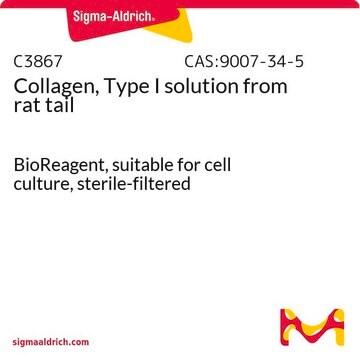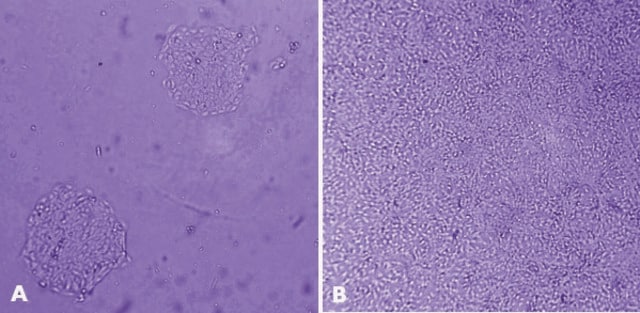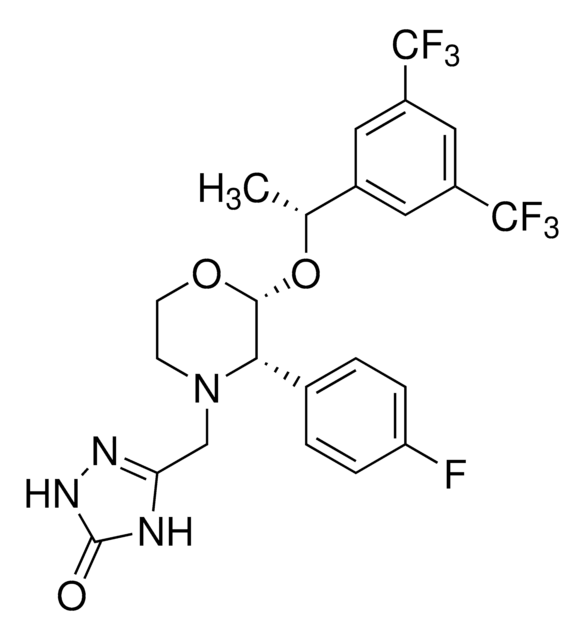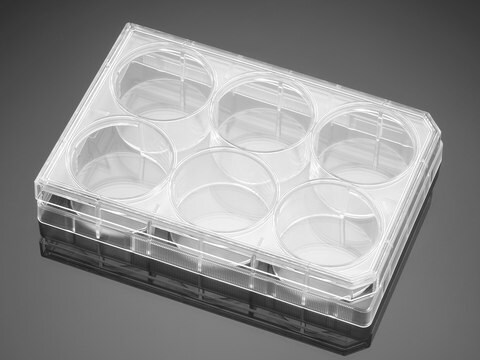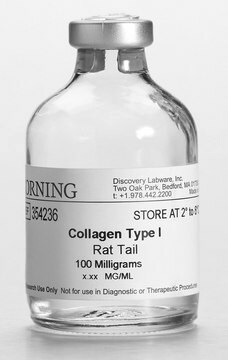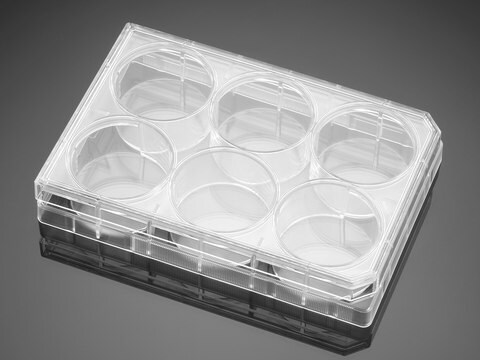ECM675
3D Collagen Culture Kit
Synonim(y):
3D Cell Culture Kit, Collagen Culture Kit, Kit for 3D Collagen Culture
Zaloguj sięWyświetlanie cen organizacyjnych i kontraktowych
About This Item
Kod UNSPSC:
12352202
eCl@ss:
32161000
NACRES:
NA.75
Polecane produkty
reaktywność gatunkowa
human
Poziom jakości
producent / nazwa handlowa
Chemicon®
metody
activity assay: suitable
cell based assay: suitable
cell culture | mammalian: suitable
Warunki transportu
wet ice
temp. przechowywania
2-8°C
Opis ogólny
Cell migration is a fundamental function of normal cellular processes, including cell proliferation, and migration. Cell behavior in vitro is typically examined in a 2D environment; however, in the body, cells exist in a three-dimensional extracellular matrix environment rich in type I collagen. In fact, cells cultured in 3D matrices better reflect in vivo cell physiology when compared to traditional 2D systems.
CHEMICON (EMD Millipore) has developed a three-dimensional cell culture system that closely simulates the collagen-rich extracellular matrix of normal tissue. This 3D system provides a simple and rapid method to analyze cell angiogenesis, migration, apoptosis, proliferation and tissue formation in a 3D-collagen matrix. Cells suspended in this 3D system are easily visualized by phase contrast or fluorescence light microscopy. Cells can be directly fixed and stained within the matrix and treated with antibodies for visualization of specific intra- and extracellular proteins. Importantly, cells suspended in our 3D system can also be treated with various reagents allowing for extensive screening of biological responses to growth factors and chemical agents.
As an additional benefit to investigators, sterile and viable cells may be removed from the 3D Cell Culture System for further experimentation, including FACS or biochemical analysis.
For Research Use Only; Not for use in diagnostic procedures
CHEMICON (EMD Millipore) has developed a three-dimensional cell culture system that closely simulates the collagen-rich extracellular matrix of normal tissue. This 3D system provides a simple and rapid method to analyze cell angiogenesis, migration, apoptosis, proliferation and tissue formation in a 3D-collagen matrix. Cells suspended in this 3D system are easily visualized by phase contrast or fluorescence light microscopy. Cells can be directly fixed and stained within the matrix and treated with antibodies for visualization of specific intra- and extracellular proteins. Importantly, cells suspended in our 3D system can also be treated with various reagents allowing for extensive screening of biological responses to growth factors and chemical agents.
As an additional benefit to investigators, sterile and viable cells may be removed from the 3D Cell Culture System for further experimentation, including FACS or biochemical analysis.
For Research Use Only; Not for use in diagnostic procedures
Zastosowanie
Research Category
Cell Structure
Cell Structure
This 3D system provides a simple and rapid method to analyze cell angiogenesis, migration, apoptosis, proliferation and tissue formation in a 3D-collagen matrix. Cells suspended in this 3D system are easily visualized by phase contrast or fluorescence light microscopy. Cells can be directly fixed and stained within the matrix and treated with antibodies for visualization of specific intra- and extracellular proteins. Importantly, cells suspended in our 3D system can also be treated with various reagents allowing for extensive screening of biological responses to growth factors and chemical agents.
As an additional benefit to investigators, sterile and viable cells may be removed from the 3D Cell Culture System for further experimentation, including FACS or biochemical analysis.
As an additional benefit to investigators, sterile and viable cells may be removed from the 3D Cell Culture System for further experimentation, including FACS or biochemical analysis.
Komponenty
Collagen Solution - (Part No. 90135) One bottle - 10 mL
5X RPMI Medium- (Part No. 90134) One bottle - 2.5 mL
5X M199 Medium- (Part No. 90133) One bottle - 2.5 mL
5X DMEM Medium- (Part No. 90137) One bottle - 2.5 mL
5X PBS with Phenol Red- (Part No. 90136) One bottle - 2.5 mL
Neutralization Solution- (Part No. 90138) One vial - 0.5 mL
5X RPMI Medium- (Part No. 90134) One bottle - 2.5 mL
5X M199 Medium- (Part No. 90133) One bottle - 2.5 mL
5X DMEM Medium- (Part No. 90137) One bottle - 2.5 mL
5X PBS with Phenol Red- (Part No. 90136) One bottle - 2.5 mL
Neutralization Solution- (Part No. 90138) One vial - 0.5 mL
Postać fizyczna
Collagen solution is supplied in 6mM acetate buffer at ~ pH7.0.
Przechowywanie i stabilność
Store kit materials at 4°C up to their expiration date.
Informacje prawne
CHEMICON is a registered trademark of Merck KGaA, Darmstadt, Germany
Oświadczenie o zrzeczeniu się odpowiedzialności
Unless otherwise stated in our catalog or other company documentation accompanying the product(s), our products are intended for research use only and are not to be used for any other purpose, which includes but is not limited to, unauthorized commercial uses, in vitro diagnostic uses, ex vivo or in vivo therapeutic uses or any type of consumption or application to humans or animals.
Ta strona może zawierać tekst przetłumaczony maszynowo.
Hasło ostrzegawcze
Danger
Zwroty wskazujące rodzaj zagrożenia
Zwroty wskazujące środki ostrożności
Klasyfikacja zagrożeń
Eye Dam. 1 - Flam. Liq. 3 - Met. Corr. 1 - Skin Corr. 1A
Kod klasy składowania
3 - Flammable liquids
Certyfikaty analizy (CoA)
Poszukaj Certyfikaty analizy (CoA), wpisując numer partii/serii produktów. Numery serii i partii można znaleźć na etykiecie produktu po słowach „seria” lub „partia”.
Masz już ten produkt?
Dokumenty związane z niedawno zakupionymi produktami zostały zamieszczone w Bibliotece dokumentów.
David G Leach et al.
Biomaterials, 163, 67-75 (2018-02-18)
Recent advancements in the field of immunotherapy have yielded encouraging results for the treatment of advanced cancers. Cyclic dinucleotides (CDNs) are a powerful new class of immunotherapy drugs known as STING (Stimulator of Interferon Genes) agonists, currently in clinical trials.
Zhiyong Chen et al.
Brain research, 1368, 71-81 (2010-10-19)
One of the histopathological consequences of a penetrating ballistic brain injury is the formation of a permanent cavity. In a previous study using the penetrating ballistic-like brain injury (PBBI) model, engrafted human amnion-derived multipotent progenitor (AMP) cells failed to survive
Xiaoji Wang et al.
Biochemical and biophysical research communications, 403(3-4), 264-269 (2010-11-16)
Medulloblastoma (MB) is the most devastating and common pediatric brain tumor. Tumor cells invading into surrounding tissue and disseminating through cerebrospinal fluid make treatment extremely difficult. Identifying the mechanisms of MB cells is therefore imperative for the development of novel
LiMei Wang et al.
PLoS biology, 6(11), e289-e289 (2008-12-11)
The multifunctional signaling protein p75 neurotrophin receptor (p75(NTR)) is a central regulator and major contributor to the highly invasive nature of malignant gliomas. Here, we show that neurotrophin-dependent regulated intramembrane proteolysis (RIP) of p75(NTR) is required for p75(NTR)-mediated glioma invasion
Jian-Guo Sun et al.
Oncotarget, 7(9), 9692-9706 (2015-12-24)
Tumor initiating cells (TICs) serve as the root of tumor growth. After identifying TICs in spontaneous breast tumors of the MMTV-Wnt1 mouse model, we confirmed the specific expression and activation of Yes-associated protein 1 (Yap1) within TICs. To investigate the
Nasz zespół naukowców ma doświadczenie we wszystkich obszarach badań, w tym w naukach przyrodniczych, materiałoznawstwie, syntezie chemicznej, chromatografii, analityce i wielu innych dziedzinach.
Skontaktuj się z zespołem ds. pomocy technicznej
